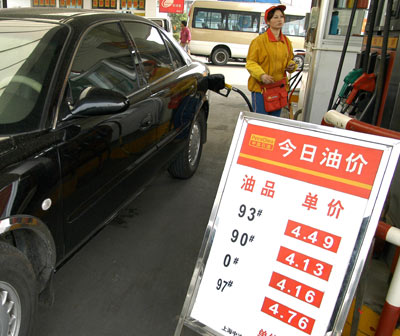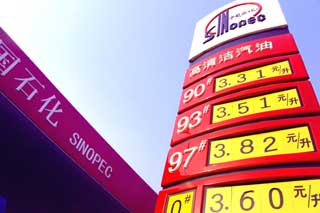The Chinese mainland lifted its processed oil prices yesterday to offset
refinery losses and bring domestic prices closer to international levels, but
promised to subsidize disadvantaged communities and public service sectors.
Ex-factory gasoline prices will be increased by 300 yuan (US$37.5) per ton
while the cost of diesel oil will rise by 200 yuan (US$24.9) per ton, the
National Development and Reform Commission (NDRC), the industry regulator, said
yesterday. Retail prices for gasoline will also rise by 250 yuan (US$30.8) per
ton, while diesel prices will rise by 150 yuan (US$18.5) a ton, it said.

A gas station employee
in Shanghai fills up a car next to a sign showing the newly raised prices.
[newsphoto] |

A fuel station in
Zhengzhou, central China's Henan Province, displays oil prices in
this October 14 file photo.
[newsphoto] | |
The decision was made because the nation's current prices of processed oil
are far below those on the international market, it said.
"This is not beneficial to oil refineries and at the same time does not help
ensure adequate supplies and improve energy efficiencies," it said in a circular
published yesterday.
In Beijing, retail prices for 93 RON grade gasoline rose to 4.65 yuan (about
58 US cents) a litre from 4.26 yuan (about 53 US cents), and zero-grade diesel
prices increased to 4.04 yuan (50 US cents) a litre from 3.74 yuan (46 US
cents), the capital city's development and reform commission said in a separate
statement, the Bloomberg reported yesterday. RON is the research octane number
that indicates the quality of the gasoline.
PetroChina said last week that it lost 19.8 billion yuan (US$2.4 billion) on
refining and fuel sales in 2005.
To offset the impact of the rises to groups sensitive to higher prices, the
commission said the State Council has decided to offer subsidies to communities
such as fishermen, farmers, State-owned forestry enterprises and urban public
transportation firms.
Oil prices have rocketed since 2003, with crude oil reaching more than US$60
per barrel on the international market this year, far higher than the price paid
for the commodity by domestic users. Prior to the price hikes, the retail price
of domestically processed oil was only about US$43 per barrel.
The taxi and public transport sectors have borne the brunt of these rising
prices.
Xue Chunsheng, a manager of the Beijing Yuyang United Taxi co Ltd, said
yesterday's price rise would increase his company's daily costs by at least 30
yuan (US$3.7) per vehicle.
With its more than 4,000 taxis, the price rise will result in an additional
monthly cost of 3.6 million yuan (US$448,000) for Xue's company. "We are
expecting the government to unveil preferential policies to help the industry,"
Xue said.